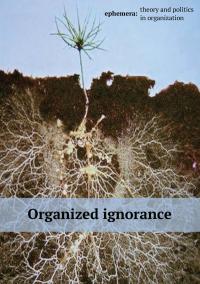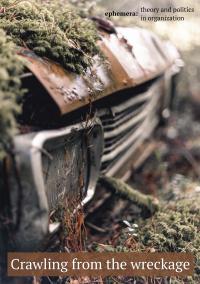Activist organizing: A post-pandemic world in the making
| Attachment | Size |
|---|---|
| CFP%20Activist%20organizing.pdf | 201.71 KB |
Issue editors: Yousra Rahmouni Elidrissi, Ozan Nadir Alakavuklar, Ekaterina Chertkovskaya, Christos Giotitsas, Yousaf Nishat-Botero
As we find ourselves in the midst of yet another crisis that undermines the ecological, political and economic bases of our lives, alternative forms of organizing are gaining renewed attention, and calls for a critical engagement with these are becoming more urgent than ever (Chertkovskaya et al., 2020; Johnsen et al., 2017; Phillips and Jeanes, 2018; Stoborod and Swann, 2014). In response to this development, the special issue aims to explore the current challenges, tensions and potentialities opened up by activist forms of organizing. In particular, it seeks to expand on how these are engaged in problematizing dominant power relations and prefiguring a more democratic, ecologically sustainable, and socially just society in the here and now.
From civil society organizations to grassroots initiatives and neighbourhood groups, progressive social movements constitute contentious spaces of reflection, action, and transformation (Della Porta, 2020). By intertwining theory and practice, these movements offer a range of emancipatory alternatives for organizing economy and society. Efforts to rethink the way we live and work include, for example, the social solidarity economy (e.g. World Fair Trade Organization), the mutualist movement (e.g. coop banks), local currencies (e.g. Bristol Pound), transition towns (e.g. Transition Network), intentional communities, and ecovillages.
In the last decade, there have been massive mobilizations around climate justice and against austerity policies, racial and gender inequality, through the precariat movement and the struggles of the everyday (Graham and Papadopoulos, 2021). These have persisted despite the challenges of the global pandemic and the associated restrictions on public action (Chattopadhyay et al., 2020; Pleyers, 2020). From global school strikes to occupations and civil disobedience, activist organizing fosters a (re)articulation of our understanding of autonomy (e.g. Bohm et al., 2010), care (e.g. Ortega-Williams, 2021), leadership (e.g. Fotaki and Foroughi, 2021), solidarity and allyship (Smolovic Jones et al., 2020). Beyond their diversity, these alternative forms of organizing embody a new world that is already in the making and contains the seeds of a post-pandemic future, bursting with hope and possibility. In this special issue, we wish to reflect on various forms of activist organizing, their bottom-up practices, tensions and transformative potentials as well as from academics’ engagement with these struggles.
While universities have long been sites of both elite reproduction and social change efforts, they are nowadays increasingly threatened by corporate-conservative agendas that aim to silence critical work and heterodox perspectives (see, for example, in France the pressure on scholars of race and decolonialism; in the UK, targeting critical management and political economy scholars for redundancies; in Russia, the political repression of DOXA journal; in Turkey, the authoritarian climate in the universities and the resistance of Boğaziçi University academics). Against this background, critical scholarship blurs the boundaries between research and organizing, drawing from the traditions of academic activism and its heritage in critical theories, including post-colonial, feminist and queer studies. Despite the numerous challenges and dilemmas it poses (Alakavuklar, 2020), engaged scholarship shows how research practices can become tools of resistance, subverting the politics of knowledge production and distribution (Choudry, 2015, 2020; Dadusc, 2014; Denzin et al., 2008; Smith, 2012) and contributing to the development of a critical praxis (see Banerjee, 2021; Bell et al., 2019; Contu, 2020; Parker and Parker, 2017; Reedy and King, 2019) that goes beyond rhetorical types of interventions (Choudry, 2020). In light hereof, we would like to hear about theoretical as well as experiential interventions of academics involved in and around activist organizing.
We invite activists, artists, practitioners and researchers to contribute to the ongoing dialogue on activism, organizing, and post-capitalist transformation. We encourage participation in a variety of formats including articles, research notes, interviews, photo essays, short films, book reviews, artistic performances and experimental contributions. Possible topics might include, but are not limited to:
- Activist organizing and emerging transformative subjectivities
- Self-management, collective ownership and other practices of activist organizing such as solidarity, autonomy, shared leadership, etc.
- Collective action and mobilization within, against and beyond capitalist practices
- Strategies, tactics and alliances of activist organizing
- Challenges of/to academic-activist forms of engagement and the politics of knowledge (co-)production
- Contribution of critical theories to activist organizing: diverse economies, social movements theory, the commons, queer theory, anarchism(s), Marxism(s), feminism(s), post/de-colonialism(s), etc.
Contributions
ephemera encourages contributions in a variety of formats including articles, notes, interviews, book reviews, photo essays and experimental modes of representation. Information about some of these formats and ephemera’s submission guidelines can be found at: www.ephemerajournal.org/how-submit. For our formatting rules, please see the ‘Abc of formatting’ guide. The submissions will undergo a double-blind review process. For further information, please contact one of the special issue editors.
Deadline for submisisons: 31 January 2022
All submissions should be sent to one of the special issue editors: Yousra Rahmouni Elidrissi (y.rahmounielidrissi AT uu.nl), Ozan Nadir Alakavuklar (o.n.alakavuklar AT uu.nl), Ekaterina Chertkovskaya (ekaterina.chertkovskaya AT miljo.lth.se), Christos Giotitsas (chris.giotitsas AT gmail.com) or Yousaf Nishat-Botero (Yousaf.Nishat-Botero AT cass.city.ac.uk).
references
Alakavuklar. O. N. (2020) ‘(Re)Imagining the activist academy’, In A. Pullen, J. Helin and N. Harding (eds.) Writing Differently - Dialogues in CMS (vol. 4) (pp. 193-207). Emerald Publishing.
Banerjee, S.B. (2021) ‘Decolonizing management theory: A Critical perspective’, Journal of Management Studies, doi: 10.1111/joms.1276.
Bell, E., S. Meriläinen, S. Taylor and J. Tienari (2019) ‘Time’s up! Feminist theory and activism meets organization studies’, Human Relations, 72(1): 4-22.
Bohm, S., AC. Dinerstein and A. Spicer (2010). ‘(Im)possibilities of autonomy: SocialMovements in and beyond Capital, the State and Development', Social Movement Studies, 9(1): 17-32.
Chattopadhyay, S., L. Wood and L. Cox (2020) ‘Organizing amidst COVID-19’, Interface, 12(1): 1-9.
Chertkovskaya, E. O.N. Alakavuklar, E. Husted and M. Rácz (2020) ‘Reconfiguring work and organizing for post-pandemic futures’, ephemera, 20(4): 1-18.
Choudry, A. (2015) Learning activism: The intellectual life of contemporary social movements. Toronto, Ontario, Canada: University of Toronto Press.
Choudry, A. (2020) ‘Reflection on academia, activism and the politics of knowledge and learning’, The International Journal of Human Rights, 24(1): 28-45.
Contu, A. (2020) ‘Answering the crisis with intellectual activism: Making a difference as business schools scholars’, Human Relations, 73(5): 737-757.
Dadusc, D. (2014) ‘Power, knowledge and resistances in the study of social movements’, Contention, 1(2): 47-60.
Della Porta, D. (2020) ‘How progressive social movements can save democracy in pandemic times’, Interface, 12(1): 355-358.
Denzin, N.K., Y.S. Lincoln and L.T. Smith (2008) Handbook of critical and indigenous methodologies. Los Angeles: Sage.
Fotaki, M. and H. Foroughi (2021) ‘Extinction Rebellion: Green activism and the fantasy of leaderlessness in a decentralized movement’. Leadership. doi: 10.1177/17427150211005578.
Graham, J. and D. Papadopoulos (2021) ‘Organizing the precarious: Autonomous work, real democracy and ecological precarity’, Organization, doi: 10.1177/13505084211026874.
Johnsen, C.G., M. Nelund, L. Olaison, and B.M. Sørensen (eds.) (2017) ‘Organizing for the post-growth economy’, ephemera, 17(1).
Ortega-Williams, A. ‘Organizing as “Collective-Self” Care Among African American Youth in Precarious Times’, Journal of African American Studies, 25, 3–21.
Parker, S. and M. Parker (2017) ‘Antagonism, accommodation and agonism in critical management studies: Alternative organizations as allies’, Human Relations, 70(11): 1366-1387.
Phillips, M. and E. Jeanes (eds.) (2018) ‘What are the alternatives? Organising for a socially and ecologically sustainable world’, ephemera, 18(4).
Pleyers, G. (2020) ‘The pandemic is a battlefield. Social movements in the COVID-19 lockdown’, Journal of Civil Society, 16(4): 295-312.
Reedy, P.C. and D.R. King (2019) ‘Critical performativity in the field: Methodological principles for activist ethnographers’, Organizational Research Methods, 22(2): 564-589.
Smith, L.T. (2012) Decolonizing methodologies. London: Zed Books.
Smolovic Jones, S., N. Winchester and C. Clarke (2020) ‘Feminist solidarity building as embodied agonism: An ethnographic account of a protest movement’, Gender, Work and Organization, 28(3): 917-934.
Stoborod, K. and T. Swann (eds.) (2014) ‘Management, business, anarchism’, ephemera, 14(4).




